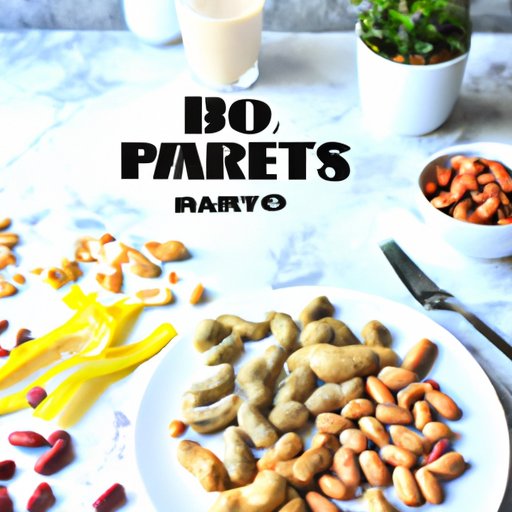Introduction
The ketogenic (keto) diet is one of the most popular ways to lose weight and improve overall health. While it’s not necessarily a new diet, it has recently gained traction with people looking to shed pounds quickly and safely. The keto diet is based on a high-fat, low-carbohydrate approach that puts your body in a state of ketosis, where it burns fat rather than carbohydrates for energy. But while the keto diet may help you reach your weight loss goals, it’s important to make sure you’re getting all of the essential nutrients your body needs. That’s where peanuts come in.
In this article, we’ll take a look at the benefits and risks of eating peanuts on a keto diet, how many peanuts you should eat, and some tips for incorporating peanuts into your meal plan.
How Many Peanuts Can You Eat on Keto?
When it comes to figuring out how many peanuts you should eat on a keto diet, the answer isn’t as simple as you might think. That’s because everyone’s nutritional needs are different. To determine how many peanuts you should eat, you’ll need to calculate your individual macronutrient needs. Macronutrients, or “macros,” include protein, fat, and carbohydrates. On a keto diet, the goal is to get the majority of your calories from fat, so you’ll want to make sure you’re getting enough fat in your diet.
Once you’ve calculated your macro needs, you’ll also want to track your peanut intake. This means keeping a food diary or using an app like MyFitnessPal to track what you’re eating. This will help you stay on top of your calorie and macronutrient goals and ensure you’re getting enough of each nutrient.
Is Eating Peanuts Allowed on a Keto Diet?
The short answer is yes, peanuts are allowed on a keto diet. However, it’s important to understand the nutritional content of peanuts before you start adding them to your meals. Peanuts are a type of legume, which means they are high in protein and contain a variety of vitamins and minerals. In terms of macros, peanuts have a relatively balanced profile, with a good mix of protein, fat, and carbohydrates.
Let’s take a closer look at the nutritional content of peanuts:

Peanuts on Keto: A Closer Look at the Nutritional Content
Protein: Peanuts are a great source of protein, with 7 grams per ounce (28 grams). Protein is essential for building and maintaining muscle mass, so it’s important to make sure you’re getting enough in your diet.
Fat: Peanuts are also a good source of healthy fats, with 14 grams per ounce. Healthy fats are important on a keto diet, as they provide energy and help keep you feeling full.
Carbs: Peanuts contain 6 grams of carbohydrates per ounce. While this may seem like a lot, keep in mind that 4 of those grams are fiber, which helps keep your digestion regular and can help you feel full longer.
Fiber: As mentioned above, peanuts are a good source of fiber, with 4 grams per ounce. Fiber is essential for a healthy digestive system, and it can also help you feel fuller for longer.
Vitamins and Minerals: Peanuts are a good source of several essential vitamins and minerals, including vitamin E, niacin, folate, magnesium, phosphorus, zinc, and copper.
What are the Pros and Cons of Eating Peanuts on a Keto Diet?
Like any food, there are both pros and cons to eating peanuts on a keto diet. Here’s a breakdown of the benefits and risks associated with eating peanuts:
Pros:
- Good source of protein and healthy fats
- High in fiber, which helps with digestion and satiety
- Rich in vitamins and minerals
Cons:
- Can be high in calories if not eaten in moderation
- May cause digestive issues if eaten in large amounts
- Contain phytic acid, which can interfere with mineral absorption
Tips for Incorporating Peanuts into Your Keto Meal Plan
If you’re looking to add peanuts to your keto meal plan, there are a few things you should keep in mind. First, it’s important to find ways to include peanuts in your meals. This could mean adding them to salads, stir-fries, or homemade trail mix. It’s also important to monitor your nutritional intake and make sure you’re not overdoing it on the calories. Lastly, it’s important to be mindful of portion size. A single serving of peanuts is 1 ounce (28 grams), or about one handful.
Conclusion
Eating peanuts on a keto diet can be a great way to get the nutrition your body needs. They’re a good source of protein, healthy fats, fiber, and essential vitamins and minerals. However, it’s important to be mindful of your calorie and macronutrient intake, and to make sure you’re eating peanuts in moderation. With these tips in mind, you can enjoy peanuts on your keto diet without compromising your health or weight loss goals.
(Note: Is this article not meeting your expectations? Do you have knowledge or insights to share? Unlock new opportunities and expand your reach by joining our authors team. Click Registration to join us and share your expertise with our readers.)
